
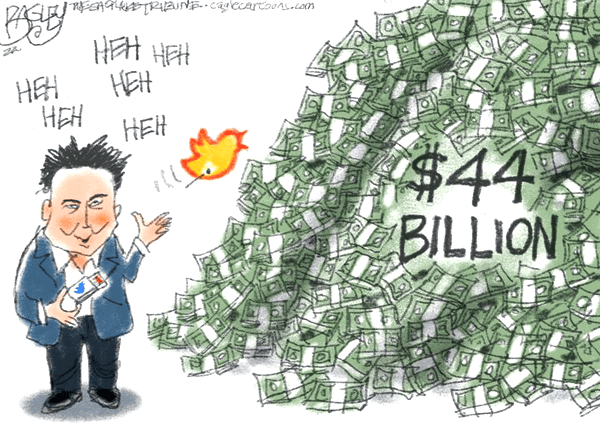
Pastis and Bagley make an understandable, but fatal error: They assume Elon Musk accidentally lost money on the Twitter deal.
I’m sure he wishes it could also have been a profitable venture, but it is becoming increasingly clear that profit was not his motivation, from the absurdly high price he offered, to the policies he immediately put into place that drove advertisers from the platform.
He’s no rocket scientist, despite funding a rocket company, and he’s no automotive engineer, despite funding a car maker.
But, unlike Donald Trump, he hasn’t left piles of bankruptcies in his wake, and, if Twitter appears to be a flaming Dumpster, a closer inspection suggests that maybe he was investing with a goal other than monetary profit.
Unlike Donald Trump, he owns a successful social media platform that is filling with gibbering lunatics, grifters and fascisti. If his goal is influence rather than money, he’s made a smart investment, because he’s miles ahead of Parler and Truth Social and other similar platforms that attempted to build authoritarian echo chambers from the ground up.
If you had a cunning plan to drug people, you’d be silly to start up a franchise called “Downer Burger” when you could simply purchase McDonald’s and slip the barbiturates into the regular menu.
Welcome to Twitter!
And welcome to all sorts of other things as well.
Juxtaposition of the Day
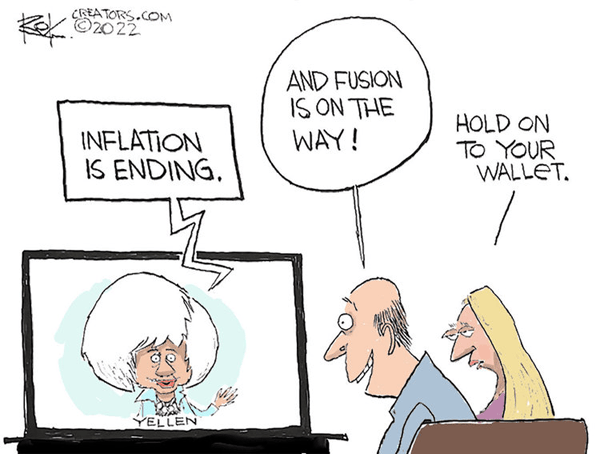
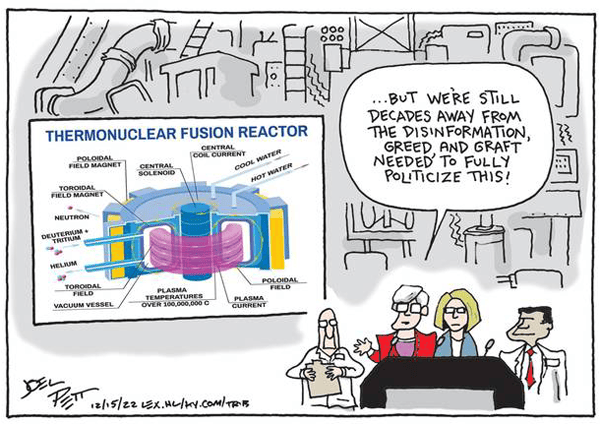
I had passed over Bok’s cartoon, because I couldn’t see any logical connection between Janet Yellen’s discussion of falling inflation rates and the announcement of a successful, if limited, fusion project.
But when I came upon Pett’s commentary, I realized the connection was cynicism: A deep distrust that, in Bok’s case, applies to both economics and science, and, in Pett’s, to our ability to develop a new technology without corruption.
There is a point at which healthy skepticism become irrational paranoia, or, at least, where it begins to mirror the joke about the two psychiatrists who passed on the street, each saying “Good morning” then walked away, each wondering “What did he mean by that?”
I saw an analysis in which a Knowledgeable Person projected the first commercial fusion applications in 2030, and my own skepticism kicked in, questioning the necessary gap between an initial venture and making any real difference in the overall energy scene.
Perhaps Pett also misses the days when we focused efforts on things like moon landings, it having been only eight years or so between JFK’s promise and Neil Armstrong’s giant leap. It’s more cynical than paranoid to assume we won’t apply that kind of effort this time around, or, at least, that we won’t apply it as a national interest rather than turn it over to the private sector to exploit.
It’s cynicism bred of what happened when the developers of insulin tried to give the patents away free for the good of humanity.
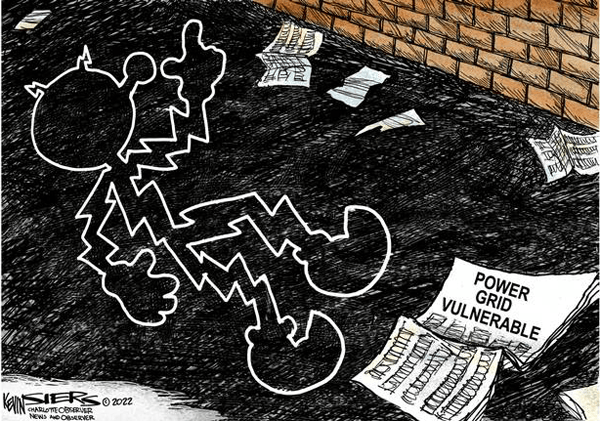
Kevin Siers offers a different cynical view of electricity, pointing out that we’ve known for decades that our power grid was vulnerable and have done almost nothing about it.
When 30 million people in the Northeast lost power in 1965, rumors quickly spread that it was some enemy sabotage, though it turned out to be a tripped relay switch that automatically triggered a domino effect. A few changes and improvements were made, but damned if it didn’t happen again in NYC in 1977 and then again in 1981, for slightly different, but not different enough, reasons.
And just last year, the State of Texas suffered a major power loss so severe that they were forced to dispatch a United States Senator on a fact-finding mission to Cancun, though they don’t appear to have made many major changes to prevent it happening again.
What has changed, however, is that we’ve now seen a pair of cases in which individuals have purposely shot out power substations causing somewhat smaller, but no less disruptive, losses of power.
I wish I could dismiss the notion as paranoia, but I strongly suspect this is what our next Civil War is going to look like: Not blue armies and gray armies facing off over formal battlefields, but unregistered, unaffiliated terrorist groups shooting up the infrastructure in hit-and-run attacks more reminiscent of Bloody Kansas and Quantrill’s depredations.
And we’ve seen that John Brown is a hero to some people and Quantrill a hero to others and nobody is a hero to everybody.
It simply depends on who, and what, you’ve been inspired to hate, though, of course, as we did then, we’ll wring our hands and insist we never told anyone to do THAT.
Juxtaposition of the Day #2
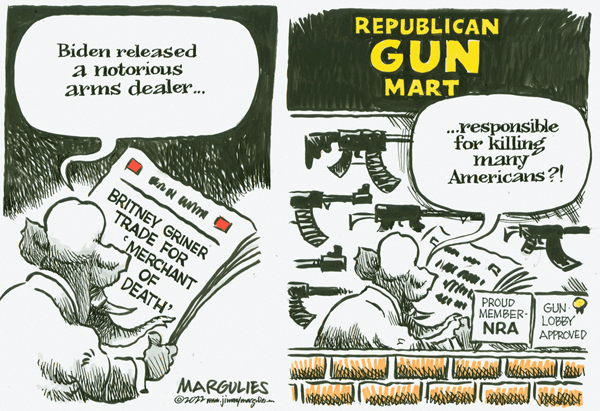

But you don’t have to issue direct orders. You just have to stir up hostility and division, and keep the means of destruction readily available.
As Margulies points out, we’ve very good at stoking fear over a superannuated, out-of-touch arms dealer in a country with no spare arms to sell anyone, but, while we fret over that mote in Vladimir Putin’s eye, we ignore the beam in our own.
Meanwhile, Bramhall marks the 10th Anniversary of the Sandy Hook slaughter by noting that, rather than doing anything about it, we’ve woven these predictable, preventable horrors into the normal texture of our lives.
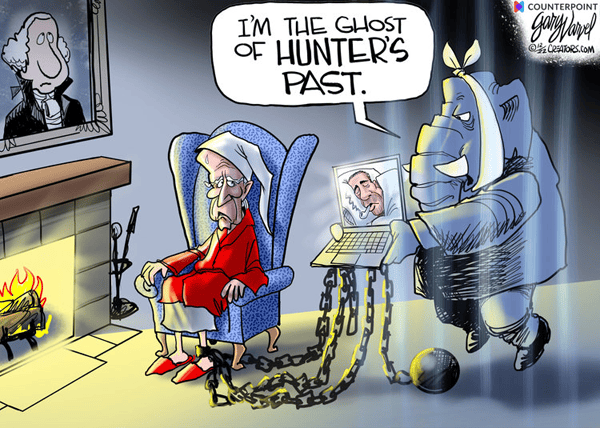
Even the celebration of Christ’s birth is being weaponized to sow division. Gary Varvel (Creators) often proclaims his Christian faith, but appears to have forgotten the Good Shepard who painstakingly sought a missing lamb, and the father who loved his Prodigal Son.
He’s also reversed Ezekiel, so that it is the children who eat sour grapes and the parents whose teeth are set on edge, though the prophet only cited the proverb to insist that the Lord judges each by their own actions.
And he’s somehow missed the entire point of Dickens’ story, in which the Spirits did not come to condemn Scrooge but, rather, to remind him of the decent, loving person he had once been, and persuade him that the world would be a better place if he would end the hostility and lack of charity that had overcome his lonely, despairing soul.
Makes you wonder if he’s read either book.
The comment about Downer Burger was classic. Hope you don’t mind me stealing it, though I will mention where I read it. My friends know I’m not that original.
re “Nobody is a hero to everybody” — sadly true, but I’m reminded of a Jane Gaskell sf novel in which outer space aliens invade and conquer Great Britain, and just to cow the populace decide to execute a famous citizen in public, one who whose death will cause English morale to crater. They go with Ringo Starr.
Varvel “proclaims his Christian faith.” Judging from his cartoons he doesn’t actually practice it though.
Maybe I just woke up on the “nothing new under the sun” side of the bed this morning . . .
The quip about fusion is that it’s been 10 years away from commercialization for 50 years, and I remember hearing that at least 30 years ago. Every so often an announcement of an incremental breakthrough gets made, everyone gets excited about endless pollution-free energy, and then we forget. I think we latch onto fusion like a drowning man to a life preserver, desperate to tech our way out of our climate situation. The new wrinkle for me is that I’m hearing a cynicism I haven’t before: that because the fusion research happened at Lawrence Livermore National Laboratory, which also does nuclear weapons research, OF COURSE the government is funding it for evil purposes. As if the few thousand hydrogen bombs we already have aren’t destructive enough?
Also not new under the sun: I have a neighbor and friend who was an FBI agent working domestic terrorism in the 1970s, who told me long ago that power transformers were a favorite target of bombers (Weather Underground et al) back then. They’re often remote, secured by little more than a chain-link fence, and easy to shoot at or throw a stick of dynamite at from the road. Big bang for little risk or cost. Also, utility people routinely see equipment spattered with buckshot that didn’t do any serious damage, making it a very underreported kind of crime. Apparently a fair number of drunken yahoos just like making sparks fly.
Which is to say, little in either of these stories surprises me.
I agree with Al that your “Downer Burger” metaphor is a gem. Good ‘un.
@Mark B: Ah, but Varvel’s just practicing the modern American version which just consists of having the correct opinion about everything. As long you spend enough time looking down your nose at “the out-group of the day”, be it LGBT folk, Democrats, single moms, or public school teachers, whatever else you do doesn’t matter a bit.
Why do people always forget the quotation marks when they write about “Truth” Social?